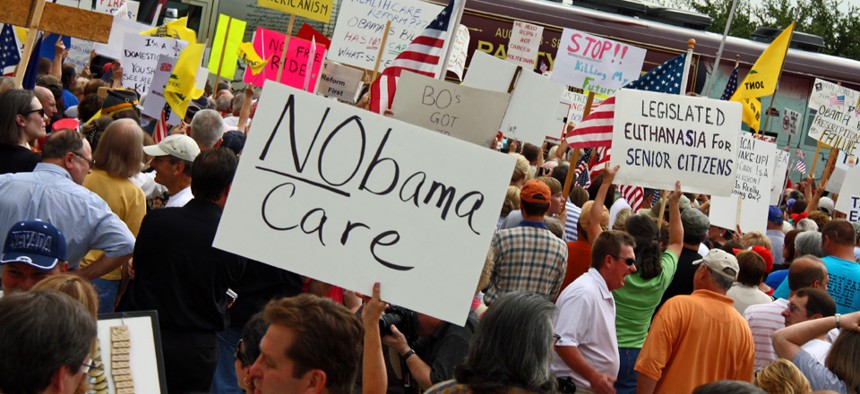
Ken Durden/Shutterstock.com
Forget Hobby Lobby—This Case Could Wreck Obamacare
A ruling is expected any day now in a case that could tear the Affordable Care Act apart.
A federal appeals court might be on the verge of blowing a massive hole in the foundation of Obamacare.
The U.S. Court of Appeals for the D.C. Circuit is expected to rule any day now in a lawsuit that aims to block the law's insurance subsidies in more than half the country. If the challengers ultimately prevail, the Affordable Care Act's complex framework could begin to unravel as millions of people lose financial assistance.
For now, the stakes are a lot higher than the odds of success—challenges to the insurance subsidies have a 0-2 record in federal courts. But the pending D.C. Circuit ruling may be the one to break that streak, according to legal experts on both sides of the issue.
A three-judge panel heard oral arguments in the case, Halbig v. Sebelius, in March. Two judges appeared to split along partisan lines, leaving Judge Thomas Griffith, a George W. Bush appointee, as the likely swing vote. Griffith seemed during oral arguments to at least be open to the challengers' arguments, and perhaps leaning in their direction.
A ruling against the Obama administration wouldn't immediately damage the Affordable Care Act, and it wouldn't mean that the administration will ultimately lose. But it would give the challengers their first victory and ensure that the issue keeps moving through the courts.
"I … think it's going to get far more attention than it deserves," said Timothy Jost, a law professor at Washington & Lee University and a supporter of the Affordable Care Act.
Halbig aims to cut off the law's insurance subsidies in federally run insurance exchanges—subsidies that nearly 7 million people are already receiving.
Obamacare set up an insurance marketplace in each state and authorized the federal government to operate the exchanges in states that wouldn't set up their own. The exchanges were designed primarily for people who buy insurance on their own, rather than getting it through their employer, and the law provides tax subsidies to help most of those consumers cover the cost of their premiums.
The Halbig challenge argues that the Obama administration—specifically the IRS—is breaking the law by offering those tax subsidies in all 50 states. It relies mainly on the text of the statute, which authorizes subsidies in "an exchange established by the State."
That phrasing clearly restricts subsidies to state-run exchanges and does not authorize them to flow through the federally run fallback exchange, the lawsuit claims.
But the Justice Department says that reading is too narrow, and the challengers have had a hard time convincing judges that Congress intended to set up a two-tiered system.
"The plain text of the statute, the statutory structure, and the statutory purpose make clear that Congress intended to make premium tax credits available on both state-run and federally facilitated Exchanges," D.C. District Court Judge Paul Friedman wrote in his ruling on the subsidies.
Even taking the "established by the State" language into account, the Justice Department and lower courts said, the statute as a whole indicates that Congress intended to treat all exchanges equally. The federal government "stands in the shoes" of states, the Obama administration argues.
"Congress is clearly indicating that it wants a system of exchanges, nationwide, to provide affordable health care for all Americans. States have the first opportunity to establish those exchanges under this framework, but if they don't, that same exchange is created by the [Health and Human Services] secretary," Justice Department lawyer Stuart Delery said during the Halbig arguments in March.
The challengers in Halbig and its companion lawsuits say Congress wanted to use the subsidies as an incentive for states to set up their own exchanges. Friedman, though, said "there is no evidence in the legislative record that the House, the Senate, any relevant committee of either House, or any legislator ever entertained this idea."
The challengers appealed Friedman's Halbig ruling to the D.C. Circuit on an expedited timeline, which is why a decision is expected soon. Jost said the fact that the court hasn't ruled yet might be a sign that Griffith, the swing vote, wasn't ready to quickly sign on to a ruling axing the subsidies.
A district court in Virginia dismissed a nearly identical lawsuit, also saying there was no evidence that Congress intended to make subsides available only through state-run exchanges. That case, King v. Sebelius, was appealed to the 4th Circuit Court of Appeals, which could also issue its ruling soon.
Sophie Novack contributed to this article.
This article appears in the July 7, 2014 edition of NJ Daily.
(Image via Ken Durden / Shutterstock.com)






